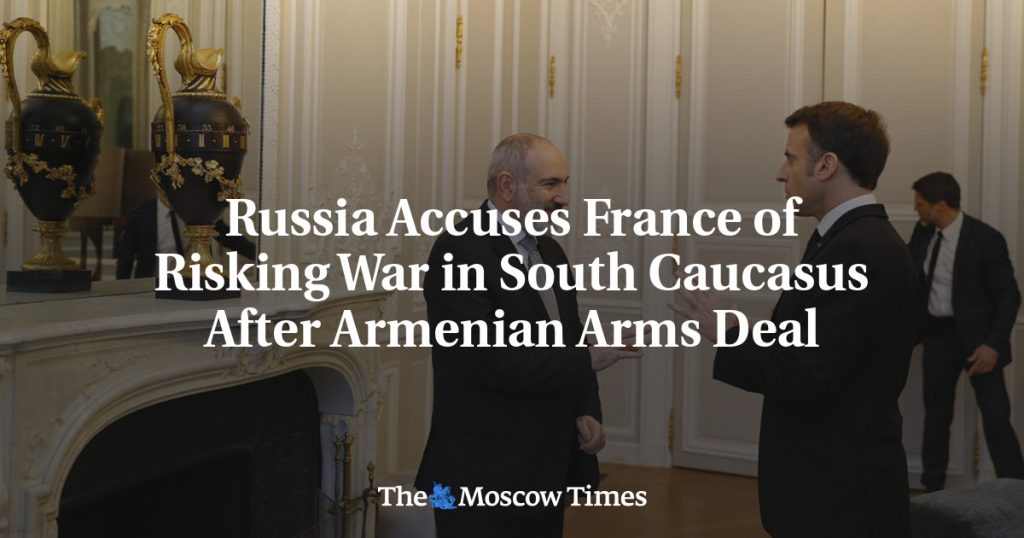Russia has accused France of exacerbating conflict in the South Caucasus region by signing a deal to sell artillery systems to Armenia. Russian Foreign Ministry Spokeswoman Maria Zakharova criticized France for provoking armed confrontation in the region through this sale, which she described as another step in Paris’ actions. Azerbaijan’s Defense Ministry also spoke out against France, accusing the country of promoting militarization and geopolitical intrigue while hindering efforts to normalize relations between Armenia and Azerbaijan. The statement from Azerbaijan warned of the risk of a new war as a result of Armenia’s increasing security ties with the West, seen as a move away from its traditional ally Russia.
Armenia’s purchase of the French-made CAESAR self-propelled howitzers is seen as a signal of its interest in strengthening security ties with Western countries amid strained relations with Moscow. Tensions between Armenia and Russia have escalated since Russian peacekeepers did not intervene during Azerbaijan’s offensive in the disputed region of Nagorno Karabakh in 2023. This incident has contributed to Armenia’s shift towards seeking support from Western allies like France. The purchase of artillery systems from France indicates Armenia’s desire to diversify its security partnerships and reduce its reliance on Russia, especially in light of recent conflicts in the region.
Russia’s criticism of France’s arms sale to Armenia reflects its concerns about losing influence in the South Caucasus region and being undermined by Western powers. The sale of artillery systems to Armenia is viewed by Russia as a deliberate provocation by France to escalate conflict in the region and challenge Russian dominance. Moscow’s accusations against France suggest a broader geopolitical rivalry in the South Caucasus, where Russia seeks to maintain its strong ties with Armenia while countering Western influence in the region. The increasing tensions between Russia and France over Armenia’s purchase of French-made weapons highlight the complex power dynamics at play in the South Caucasus.
The accusation that France is fueling conflict in the South Caucasus by selling artillery systems to Armenia has stirred further controversy and animosity between Russia, France, and other countries in the region. Russia’s criticism of France’s actions points to a larger rivalry between major powers in the region, with each country seeking to advance its own interests and influence. The sale of French-made weapons to Armenia has intensified existing tensions in the South Caucasus and raised concerns about the potential for renewed conflict in the region. The differing perspectives and interests of Russia, France, Azerbaijan, and Armenia have created a volatile situation that could potentially escalate into a larger regional conflict.
The backlash against France’s arms sale to Armenia underscores the complex dynamics at play in the South Caucasus region, where competing interests and alliances have the potential to trigger further conflict and instability. The sale of French artillery systems to Armenia has reignited existing tensions between Armenia, Azerbaijan, and Russia, as each country seeks to assert its influence and secure its strategic objectives in the region. The ongoing power struggle between major powers like Russia and France in the South Caucasus highlights the fragile balance of power in the region and the need for careful diplomacy to prevent a new outbreak of violence. The implications of the arms sale for regional stability and security are significant, with the potential for further escalation and conflict if tensions continue to rise.
In conclusion, the controversy surrounding France’s arms sale to Armenia has deepened rifts and tensions in the South Caucasus region, with accusations of provocation and militarization being leveled against France by Russia and Azerbaijan. The sale of French-made artillery systems to Armenia has underscored the shifting alliances and geopolitical rivalries in the region, as Armenia seeks to bolster its security ties with the West while distancing itself from Russia. The complex power dynamics at play in the South Caucasus highlight the potential for further conflict and instability, raising concerns about the broader implications of the arms sale for regional security. As tensions continue to simmer, careful diplomacy and dialogue will be essential to avoid the risk of a new war in the South Caucasus.


